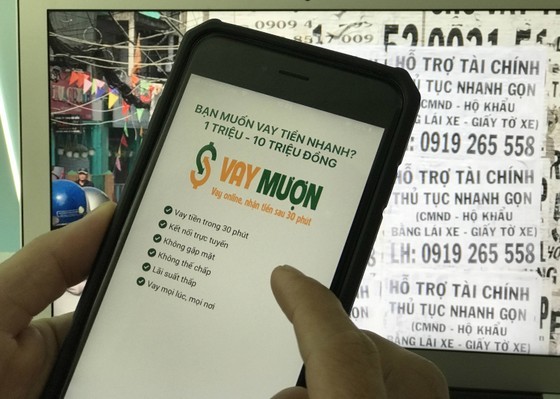 |
An online money lending app that is hard for users to check its reliability (Photo: SGGP) |
In the middle of March 2023, a large quantity of people received calls from numbers similar to those of mobile network carriers. They mentioned the status of temporary SIM card locking and asked call receivers to provide personal information by pressing certain buttons on the phone. This was actually not a formal contact method of any network carriers, which usually deliver information via SMS. This is an act of stealing sensitive information, and thus the public should be cautious. The act is not at all new because it first appeared in 2022 when criminals pretended to be state officers and did similar steps to appropriate SIM cards or bank accounts.
Not long before that, scams taking advantage of the trendy software ChatGPT happened as criminals organized sales of Chat GPT accounts on social network sites. To buy these accounts, Internet users must input confidential information like email username and password, bank account. Some cautious people stopped carrying out the process when being asked for email password, but then their inbox was full of suspicious emails to confirm password change. ChatGPT has also been used to collect data for a Deepfake attack when AI is exploited to imitate images and voices of victims for scamming purposes, especially during the approaching holiday.
Another popular trick lately is to pretend to be a bank employee to invite potential victims to increase the limit of their credit cards. Scammers will then send a link rather similar to the formal website address of the bank, which leads to a site with a similar interface to formal bank websites as well. When signing in their bank account via such a website, victims accidentally have their sensitive information stolen. This trick is rather popular when a bank changes its interest rates. Therefore, bank customers are asked to contact functional agencies or their bank right when they discover suspicious activities.
Bkav Co. commented that scamming tricks have become more cunning. It also mentioned the risk of banks using URL shortener function to send promotion information or official app download links to customers. This trend could be easily taken advantage of by criminals to appropriate bank accounts of customers. Hence, when receiving such a link, Internet users must open it in a quarantine virtual environment to ensure data safety and check whether the link truly leads to official websites or not.
The Public Security Ministry informed that during the upcoming holiday, seeing a large quantity of people seeking low-cost tours, criminals post ads on cheap accommodation and tours on social network sites. To book such a service, people are asked to make a deposit, which will then be appropriated.
Kaspersky Vietnam has just announced that in 2022, it detected and successfully stopped nearly 42 million Internet attacks, a drop of 34 percent compared to 2021. This is a positive signal for the information security maintenance task. Nevertheless, Kaspersky Vietnam warns that the more virtual connections people have, the higher the risk of information leak and online scamming.
The Authority of Information Security (under the Ministry of Information and Communications) informed that there are three main groups of scamming tricks: brand counterfeiting (accounting for 72.6 percent), appropriating online accounts (11.4 percent), and other tricks like online job ads, loan apps (16 percent). The ultimate goal of criminals is to steal property by taking advantage of people’s gullibility, lack of information, needs for job, and hidden greed.
It is estimated that Vietnam now has 70 million Internet users. Scammers have used the boom in IT and various virtual utility software pieces to carry out online frauds and appropriate valuable assets. The e-portal for information security of Vietnam at canhbao.khonggianmang.vn last year received nearly 13,000 cases of online scams, mostly under the two forms of personal information stealing and financial frauds. In January 2023 alone, this figure came to over 1,200 cases (reported by the National Cyber Security Center – member of the Information Security Authority).
























